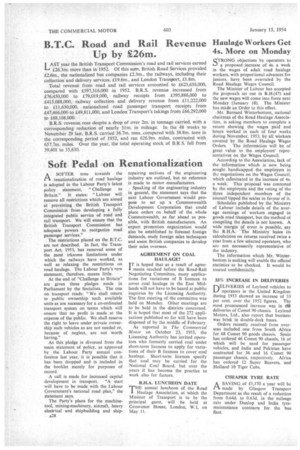Soft Pedal on Renationalization
Page 30

If you've noticed an error in this article please click here to report it so we can fix it.
ASOFTER tone towards the renationalization of road 'haulage is adopted in the Labour Party's latest policy statement, "Challenge to Britain." It states: " Labour will remove all restrictions which are aimed at preventing the British Transport Commission from developing a fully integrated public 'Service of road and rail transport. We will ensure that the British Transport Commission has adequate powers to reorganize road passenger services."
The restrictions placed on the B.T.C. are not described. In fact, the Transport Act, 1953, ha S removed some of the most irksome limitations under which the railways have worked, as well as relaxing the restrictions on road haulage. The Labour Party's new statement, therefore, means little.
At the end of "Challenge to Britain" are given three pledges made in Parliament by the Socialists. The one on transport reads: "We shall return to public ownership such available units as are necessary for a co-ordinated transport system on terms which will ensure that no profit is made at the expense of the public. We shall reserve the right to leave under private ownership such vehicles as are not needed or, because of neglect, are not worth having."
As this pledge is divorced from the main statement of policy, as approved by the. Labour Party annual conference last year, it is possible that it has been dropped and is included in the booklet merely for purposes of record.
A call is made for increased capital development in transport. "A start will have to be made with the Labour Government's national road .plan," the statement says.
The Party's plans for the machinetool, mining-machinery, aircraft, heavy electrical and shipbuilding and ship a28
repairing sections of the engineering industry are outlined, but no reference is .made to motor manufacturers. Speaking of the engineering industry _ in general, the statement says that the next Labour Government •would propose to set up a Commonwealth Development Corporation that could place orders on behalf of the whole Commonwealth, as far ahead as pos
sible, with' British manufacturers. An • export promotion organization would also be established to forecast foreign demands, study foreign sales techniques and assist British companies to develop their sales overseas.
AGREEMENT ON COAL HAULAGE?
TT is hoped that as a result of agree1 ments reached before the Road-Rail Negotiating Committee, many applications for variations of B licences to cover coal haulage in the East Midlands will not have to be heard at public inquiries by the Licensing Authority. The first meeting of the committee was held on Monday. Other meetings are to be held in the districts concerned, It is hoped that most of the 272 applications published so far will have been disposed of by the middle of February.
As reported in The Commercial Motor on October 23, 1953, the Licensing Authority has invited operators who formerly carried coal under short-term licences to apply for variations of their B licences to cover coal haulage. Short-term licences specify that coal may be carried for the National Coal Board, but over the years it has become the practice to work also for factors.
R.H.A. LUNCHEON DATE
THE annual luncheon of the Road Haulage Association, at which the Minister of Transport is to be the principal guest, will be held at Grosvenor House, London, W.1, on May 11.




































































































